Hello!
Today marks the end of season 6 of Everything Is Amazing.
And good grief, that was bigger than I expected. Over the last 11 months, I’ve written the equivalent of a decent-sized book into your Inbox - just short of 100k words by my calculations, across 47 newsletters.
I’m not a hugely prolific writer, so I need a nap just thinking about this. How on earth do successful authors like
, , and write popular newsletters and regularly knock out books at the same time? They must have equally talented identical twins they’re splitting the profits with. Only possible explanation.There are also around 6,000 more of you reading since this 6th season began. Welcome to the madness! I hope that wasn’t too bewildering for you (and if you’re ever in doubt, just go here where I confidently pretend that it all makes sense).
In my next newsletter in a few days, I’ll outline where we’re going for the next season, beginning in November - and it’s going to be a biggie (and, relatively speaking, a quickie - although maybe there’s a better way to phrase that).
But today: it’s customary at this point for me to recap everything since the season began - except this one was an absolute monster, and there’s just no way I can do that.
Instead, in no particular order, here are twenty newsletter I really enjoyed putting together this year, along with a few things I learned from researching them. I hope you find something here that you missed the first time round.
NOTE: this email is still going to be wayyyy too big for your Inbox and will get chopped off somewhere below - so you’ll have to click through to the Web version to read the whole thing. Thanks!
1. Meet The World’s Newest ‘Continent’
“If you haven’t heard of Zealandia, have no fear! It was only proposed in 1995, and it’s been a source of amiable dispute ever since: can it be considered a continent if it’s underwater, or should it be called a microcontinent fragment, or something else entirely? Even the name isn’t yet set in stone: Māori speakers would prefer it to be called Te Riu-a-Māui, meaning “the hills, valleys, and plains of Māui”…
But it has, now, been entirely mapped (hat-tip to
, reliable source of sciencey news at Curious About Everything). More formally: “This work completes offshore reconnaissance geological mapping of the entire Zealandia continent.””
2. The Man With No Working Memory
“…all Henry would have for his remaining 55 years were the memories of his early twenties, bolstered temporarily with what he could learn about the world around him over the next few dozen seconds. Nothing else would linger in his conscious brain.
His anterograde amnesia - the kind used as a lazy trope in many pulp thrillers, and much more successfully in Christopher Nolan’s haunting Memento (2000) - was devastatingly total.”
3. The ‘Stargates’ In Poland And Lithuania
“This gate isn’t what physicists call a Einstein-Rosen bridge, more popularly known as a wormhole, and so it doesn’t rotate, lock onto distant coordinates and then blast out a foaming torrent of spacetime that turns into a rippling surface that can transport you anywhere in the universe if you step through it. Instead, it’s more like a window you can look through, into the alien world on the other side.
That “alien world” is the city of Lublin in Poland, around 600 kilometres or 375 miles away, where there’s an identical-looking gate that allows Lublin’s residents to look back at Vilnius. Both gates livestream the view from their twin, 24 hours a day, allowing people in each city to wave at each other, write messages on boards in that Love Actually kind of way, compare clothes or sandwiches, and so on. There’s no sound, just video - but just being able to connect with someone in another city like that, to see them and have that sense of being together in this odd semi-real shared space for this particular moment, is a hugely affecting thing.”
4. The Madness At The Edge Of Freezing
“It’s a bleak irony that as you freeze to death, there comes a point where your skin feels like it’s alight, prompting you to struggle out of your clothes. This is called paradoxical undressing, and may happen because your ailing hypothalamus pops a fuse – or because it tries a last-ditch attempt at warming you, flinging all your capillaries open and giving you the mother of all full-bodied blushes.
You’ll also feel the urge to crawl into a small space (terminal burrowing), a mechanism that often makes it harder for rescue parties to find severe hypothermia victims.
This is not the finest hour of your survival instincts.”
5. The New Fastest Human-Made Object In The Universe
“NASA’s recent Parker Solar Probe has just broken that record by a factor of 10, already achieving a nearly unimaginable speed of 394,736 miles per hour - and next year hopefully beating that by another 30,000 mph.
(To put this into perspective: next time you stand outside looking up at the Moon, imagine a ride that would get you from here to there in just over half an hour.)”
6. One Of Our Planet’s Greatest Geographical Wonders Is Hidden Under The North Pole
“On dry land, this would be an absolutely incredible landmark - a standing tidal-wave of rock, dividing whatever continent it ran across. Millions of tourists would come to see it every year. You might have walked along it yourself, or dreamed of owning a little cottage in sight of it.
It's now called the Lomonosov Ridge, in honour of the man who guessed its existence 200 years earlier.
Now the three countries that border on it - Canada, Denmark (via Greenland) and Russia - are determined to lay claim to it.”
7. These Clouds Point To The Quickest Way Up
“Because they’re such a visible guide to air currents, glider pilots can use the edge of [lenticular clouds] to climb to incredible heights. On 2nd September 2018, pilot Jim Payne soared to 22 kilometres (74,334 feet) above the ground - twice the cruising altitude of commercial airliners, and nearly a quarter of the way to outer space.”
8. The Real-Life Lord Of The Flies Did It Best
“Lord Of The Flies certainly isn’t “proof” we’re awful - but it can feel like proof, in the depths of your being that only good stories can reach.
So I am very glad to tell you that a real-life version happened in 1965 where six boys were marooned for 15 months on a deserted island in Tonga - and things went very differently.”
9. ‘Impossible’ Things Happen More Often Than You Think
“A few years ago, newly engaged Stephen and Helen Lee were flipping through family photos at their engagement part in New York, and this happened:
Stephen: “So my future mother-in-law's flipping through the album and she sees my dad. And so she asks, oh, oh, what was his name? And my mom tells the name. And my future mother-in-law just nods and moves on and keeps on flipping through the book - doesn't even say anything.”
What Helen’s mother had just seen was the face of the man she nearly married in Korea in the 1960s, before she was warned off by her disapproving parents - and that man was Stephen’s late father.
As Stephen told This American Life:
“To think that I can talk to my mother-in-law and hear what he was like in his 20s-- something that my mom doesn't even know. And my - actually, Helen's father is a strong believer in the idea that somehow my dad - somehow is behind all this. That somehow he's helped make all this happen.”
10. We Remember Climbing Musical Mountains *Subscribers only*
“You know when a tune starts low, goes high and ends low again, like a hill made of music? Think Twinkle Twinkle Little Star or basically anything by Hans Zimmer. That progression - rising phrase, falling phrase - seems to be catnip for our memories.
“(Also used by Hans Zimmer: the auditory illusion called the Shepard Tone, which does wonderfully trippy things to the insides of our skulls.)”
11. Just Because Your Eyes Are Open Doesn’t Mean You’re Awake
“Your body is panicking because you’ve ignored every danger sign it’s thrown at you so far, and now it’s using its last desperate trick: pulling the plug completely. For 10-30 second bursts, your brain is shutting itself down, even while the rest of you appears awake. Your eyes are open, you’re moving, you may even be talking to people – but you’re definitely not present.
It’s called microsleeping – a deceptively benign term for something that kills at least 1500 people every year in the U.S. alone. Occasionally, the consequences can literally be devastating. At 1.23am on the 24th April 1986, the sleep-deprived, repeatedly-microsleeping shift workers at the Chornobyl nuclear power plants made an error that started the worst nuclear power accident in human history.”
12. How To Buy An Island
“If you have £2.5 million just kicking around, or if you’re willing to commit to paying £13,817 a month for the next 25 years after laying down a £250,000 deposit, the following is yours: seven residential properties (the majority recently renovated with double-glazing) accommodating 26 people, a tavern(!), a small, subsidized farm with around 50 black-headed sheep, and over 450 acres of hillsides and cliffs dotted with deer, puffins, storm petrels, razorbills, manx shearwater, kittiwake, gulls and seals.”
13. Writing By Hand Seems Better For Learning And Remembering *Subscribers only*
“In terms of what your hands are doing, there is a huge difference between typing a word and writing it. When you type, it’s much the same action happening - there is a bit of variation with what hand you use to hit which key, there’s a little pivoting of your arms or wrists as they move over the keyboard, but that’s about it. And tablets & smartphones? You can be hardly moving at all, frozen in place apart from a couple of your fingers doing all the work - and, perhaps more importantly, you're using those fingers in the same way for each letter you type.
Most of us can type much faster than we can write because we’re moving our bodies much less. But it seems the cost of that is we’re shortcutting our body’s role in helping us think and remember what we’re typing. That’s what handwriting is: it’s the slower, more physically arduous and complex way, but that physical demand upon us seems to be serving a really useful cognitive purpose.”
(For much more on this topic, go read the newsletter Noted by Jillian Hess.)
14. How To ‘Go Viral’ On Social Media
“Okay. You’re - really not going to like this answer, because I certainly don’t, but here goes:
It was almost entirely luck.
At least 90% luck. Maybe 95%. Maybe more.
I’m proud of that up-to-5%, which took about 6 months of sporadic experimenting and testing…but on the whole, it was pretty much luck.
For this reason, it was never "I made this go viral, yay me”. It was just good fortune - but the kind I’d made sure I could capitalize on if I found I was lucky enough to suddenly reach a lot of people.”
15. What If We Could Climb A Rope Into Space? *Subscribers only*
“Imagine if there was a big metal cable, attached to the ground, with the other end tethered to something beyond geostationary orbit, so you wouldn’t fall back to Earth once you unclipped yourself from it again.
Suddenly, going into space is a simple matter of hauling yourself up that cable inch by inch, mile by mile. It wouldn’t be quick, but wow would it be fuel-efficient - and it’d mean that your rocket could ditch most of that propellant, allowing it to be the same mass but carrying far more actual stuff! (In modern rockets the cost of lifting every kilogram into space is anything from $1,400 to $20,000. With a space elevator? Maybe as low as $200.)”
16. Even Soldiers Love Stuffed Animals
“Perhaps you’re forming an image of him right now: lantern jaw, stiff upper lip, twinkle in the eye above a clipped moustache, that sort of thing. Shoulders you could iron a shirt on. Every part the noble British wartime hero.
But what would you think if I told you he took his teddy bear with him? How would that fit with your ideas of British wartime masculinity?
It was with him when he parachuted into Italy.
It accompanied him in those Italian and German prisons.
It remained with him all his adult life - and would be joined by around 300 others, because Sir Robert Clark absolutely loved teddy bears.”
17. Can Forgetting Be A Blessing? *Subscribers Only*
“From the start of this short series, I’ve written with the rather simplistic assumption that forgetfulness is always bad and to remember is always good. But - if we couldn’t forget things, especially in this age of digital information overload, what would that do to us?
As a mild example of this, just look at the Doorway Effect, which I first learned about through behavioural scientist Tanya Tarr. Ever walked into another room and forgotten what you were meant to be doing? That’s your brain using a location-change to “flush out” what it believes to be your least important short-term memories, to keep your head clear. Sometimes our minds go haywire in the struggle to avoid taking in too much information, as with the hallucinatory nature of Troxler’s Effect - but in this case, it’s not a glitch, it’s a self-care mechanism.
How much of forgetfulness is working in the same way?”
18. Why Britain Annexed This Tiny Dung-Spattered Lump Of Rock In The North Atlantic
“It’s quite possible that someone in the government glanced at a report on Rockall, saw the word “land” and immediately envisioned a hammer and sickle fluttering above an island fortress festooned with radar dishes. Rockall was, in the words of geographer Fraser MacDonald, “sufficiently near to the range to be an embarrassment if it were acquired by some foreign power.”
Never mind the fact that nothing can cling to Rockall for long, barring truly astounding quantities of bird crap.
Never mind that Soviet spy ships could have done the job for a fraction of the cost and easily scarper out of range when detected.
No! Being “land,” Rockall was a threat to national security. It was obvious. We had to have it.”
19. The Wisdom Of Former Cynic Nick Cave
“Unlike cynicism, hopefulness is hard-earned, makes demands upon us, and can often feel like the most indefensible and lonely place on Earth. Hopefulness is not a neutral position — it is adversarial. It is the warrior emotion that can lay waste to cynicism.
Each redemptive or loving act, as small as you like — such as reading to your little boy, showing him something you love, singing him a song, or putting on his shoes — keeps the devil down in the hole.
It says the world and its inhabitants have value, and are worth defending.
It says the world is worth believing in.
In time, we come to find that this is so.”
20. How To Go For A Really Awful Walk
“Those clouds are really dark, aren’t they?
And look at how those hills are disappearing ahead, where that suddenly bone-cold wind is coming from.
It’s OK, though. Take a deep breath – and – just – release it. Feel it travel out of your body, from your deepest place to your emptiest place. Feel the air passing, watch it go with your inner mind’s eye – until only you remain, calm and still and ready for anything.
It was Billy Graham who said, “Without dark clouds in our lives, we would never know the joy of sunshine.”
Well, good for him. And didn’t he live in North Carolina, where it’s generally pretty warm all year round – at least 20 full degrees warmer than here?
Yes he did.
It’s raining hard now. Proper stair-rods.
But that’s OK too. Let it pass. Let it be. Allow it and accept it. You can always choose to do that. After all, discomfort always passes in time. Misery is just a matter of attitude. You can’t control what happens to you. You can only control your response to it.
And maybe your response right now is, “I shouldn’t have got my waterproofs from that discounted items bin in Primark.” You’ll know next time.
But that’s next time, and right now, you’re completely and utterly…
Wait. Seriously? Is…? Is that…?
Yes, it is. After less than five minutes, the rainwater has now reached your underpants.”
Back in a few days with details of what’s next!
- Mike

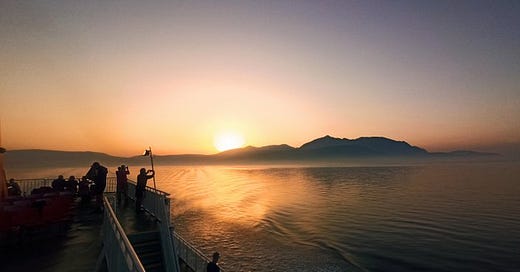


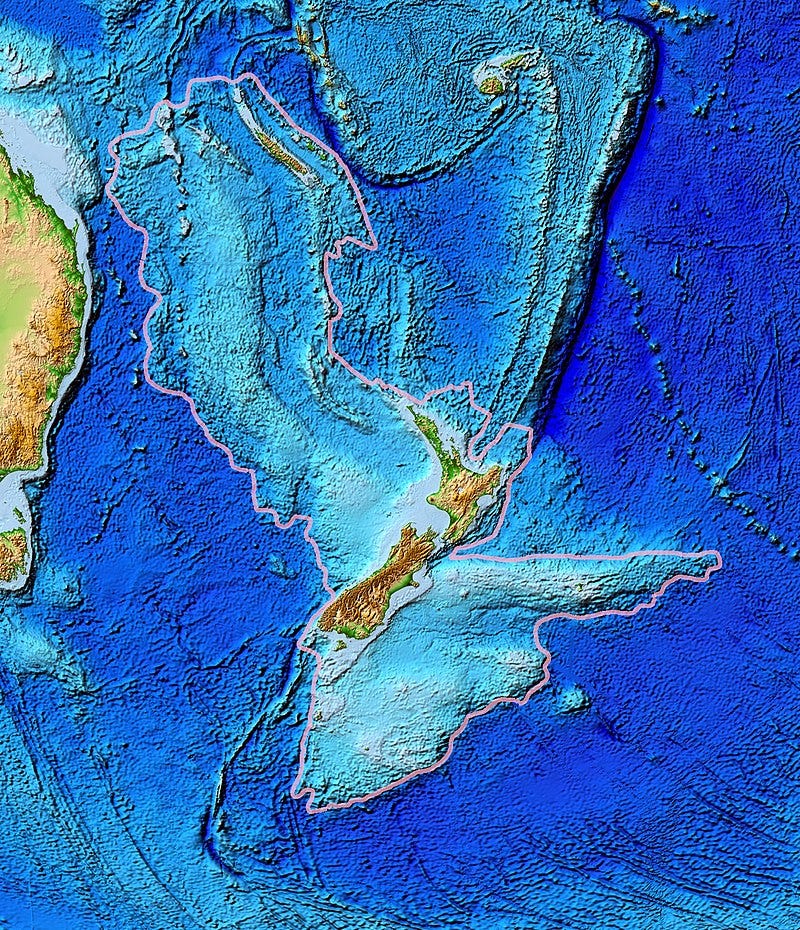

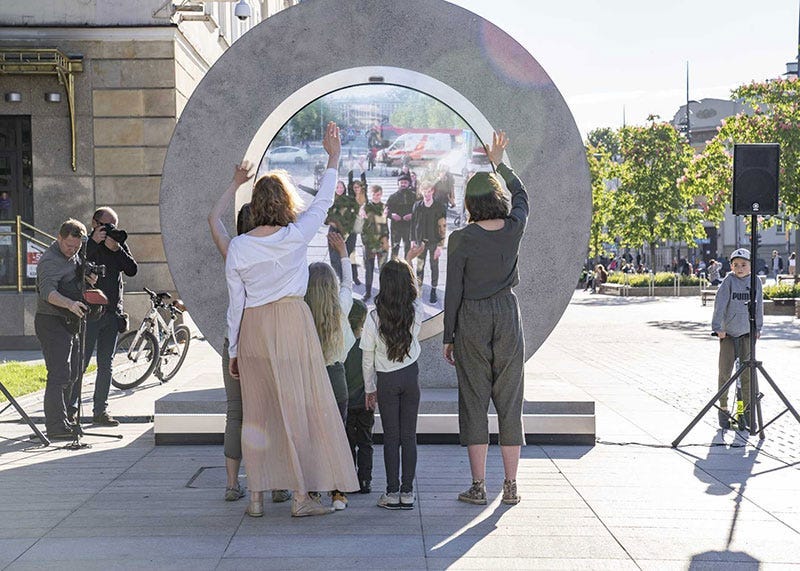

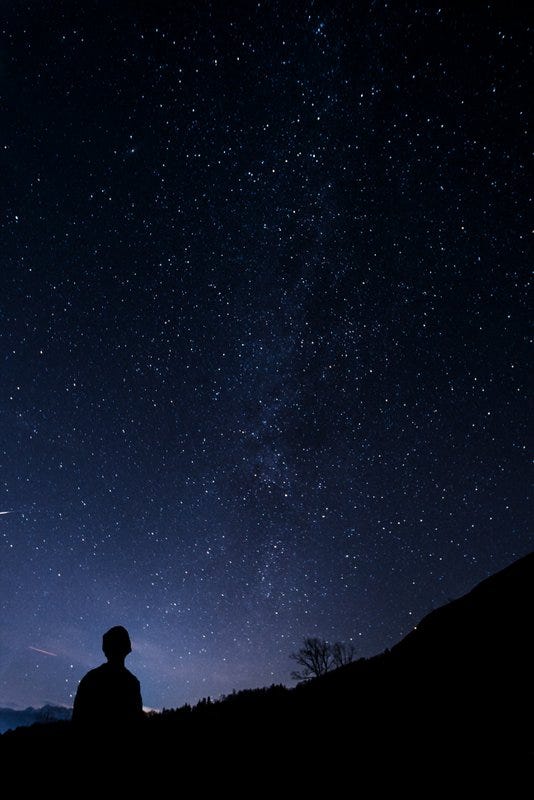
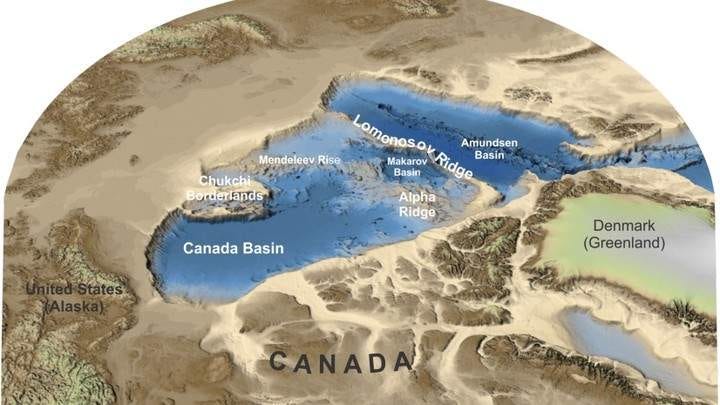
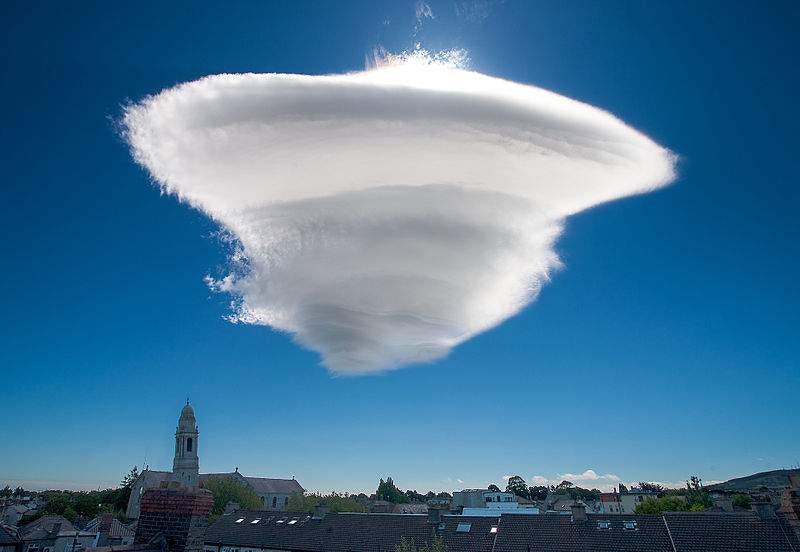
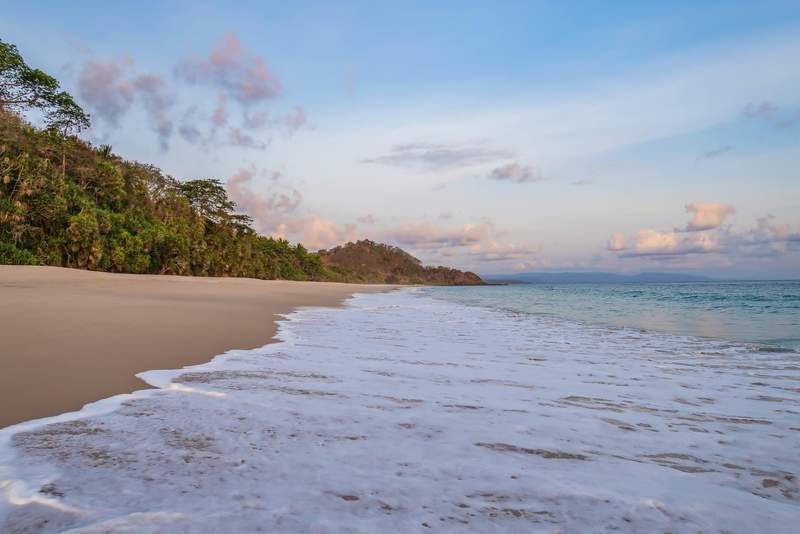



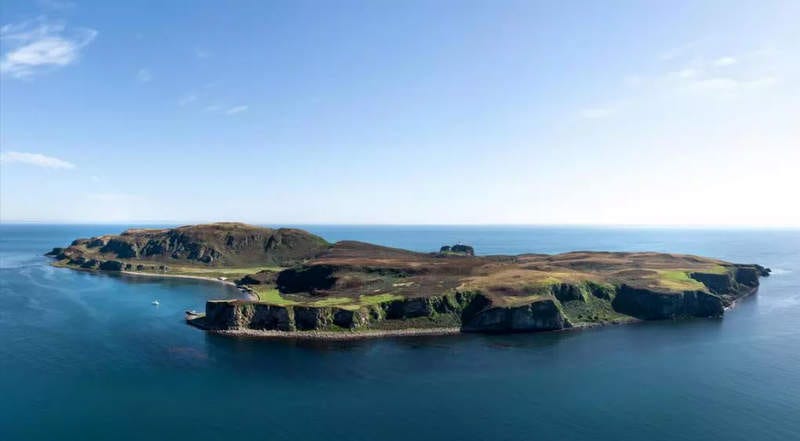

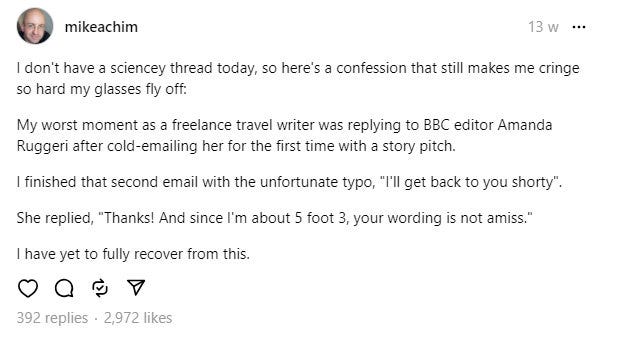
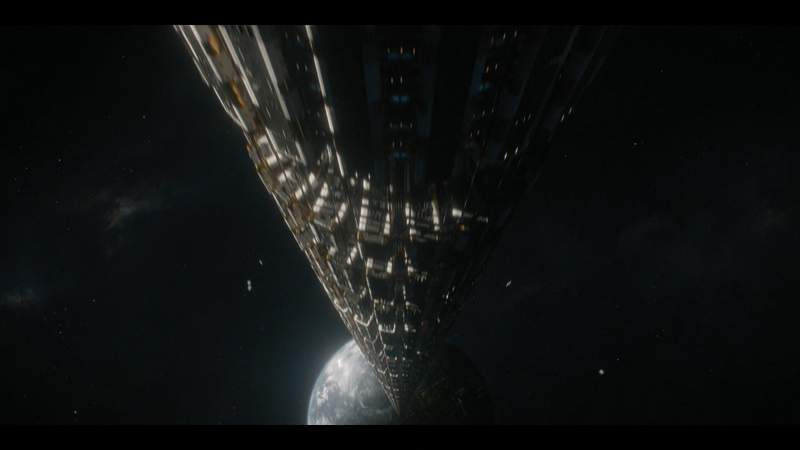


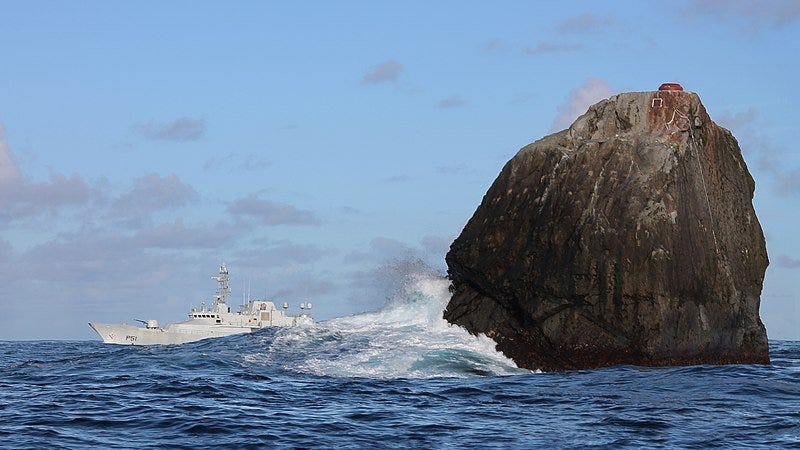
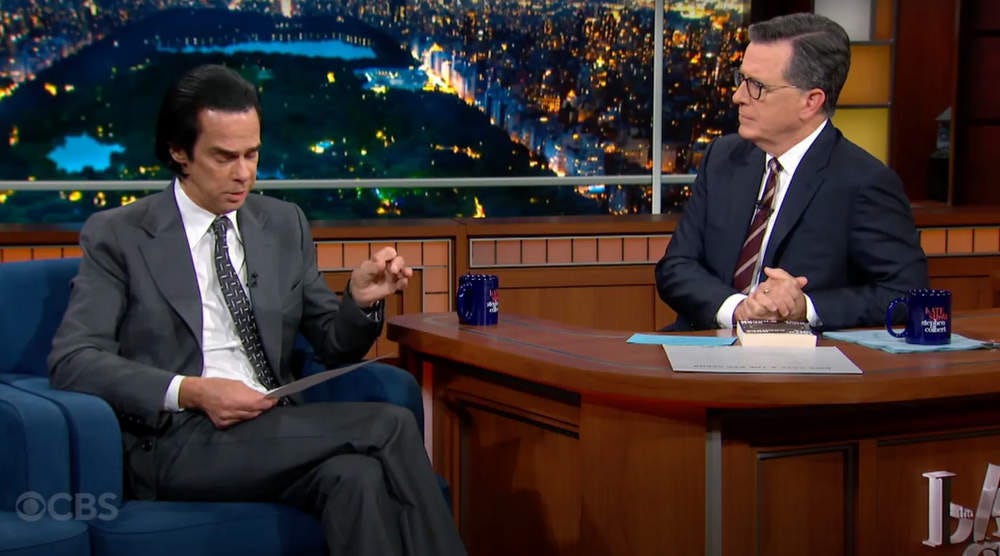

Congrats, Mike! That's amazing. And I'm so excited to find out what's next.
Congratulations, Mike! Amazing, indeed!! ✨